- Home
- A. S. Byatt
The Virgin in the Garden Page 3
The Virgin in the Garden Read online
Page 3
Bill was in many ways a reincarnation of the original spirit of Blesford Ride. He proclaimed the weighty agnostic morals of Sidgwick, George Eliot and the first Matthew Crowe. He worked ferociously at his own version of Ruskin’s and Morris’s popular culture, with a dour respect for real workers and their lives and interests more akin to Tawney’s work in the Potteries. The vigour behind what local cultural life existed in 1953 was in large part his. He gave University Extension lectures to which people travelled miles in all weathers, in vans and country buses, from moorland villages, seaside resorts, wool towns and steelworks. He ran a Settlement in Blesford Church Hall, and was a power behind the continuation of the Literary and Philosophical Society in Calverley. He could make people do things, themselves, that were durable and worth doing. The Settlement dramatised, and put on a series of Lawrence’s Tales with a grimly manic perfectionism recognisably his. The Lit. and Phil. had accumulated and catalogued its own series of “papers” on local literature and culture, from a study of rhyming games by a singing teacher, through a study of the symbolism of the drawings of the patients in Mount Pleasant Mental Home done by a menopausal amateur painter who had spent time there, to scholarly essays on the sources used by Mrs Gaskell in Sylvia’s Lovers. There were informed amateur studies of speech patterns, and researched interviews with writers who lived and worked in the North, done by shopkeepers, teachers, business men’s wives. Bill’s distinction was to stamp the work not as pupil-work but as Work worth doing, and to give the collection, and the community that collected it, a sense of identity. He was a slave-driver, but also a listener: he could give an inarticulate woman the right hints about the direction in which her clumsy sentences might be twisted to make a pleasantly idiosyncratic style. All this without neglecting the Blesford Ride boys, whom he drove through exams, harassed, taunted and stretched.
He had made a not very vigorous attempt, when Alexander first arrived, to draw him into all this local work. But Alexander, reasonably good with boys, had less touch with adults. And even then he considered himself an embryonic metropolitan professional writer, and recognised with a mixture of arrogance and humility that he was unable to add anything to the energies of this communal, provincial, amateur striving. If he had wanted to, he would have had trouble, since his literary priorities bore little relation to Bill’s. Bill accepted his lack of apparent enthusiasm surprisingly equably. Bill was bad at delegating power or authority, and Alexander, who saw himself as poet first and schoolteacher second, wanted neither. Bill inspired fanatical devotion in most good pupils and some bad ones. Alexander, despite his spectacular good looks and enthusiasm for the subject, did not. He was genuinely shy and unassuming, and perhaps finally for this reason Bill seemed to like him.
Nevertheless, he was not sanguine about Bill’s probable reactions to play and festival. Bill would be particularly displeased by Crowe’s initiatives in the matter. Crowe, an easy charmer, had tried to draw Bill, whose energies he had recognised, into his circle, not without one startling success. They had collaborated on the Lit. and Phil.’s 1951 Beggar’s Opera, where both had seen that their talents were complementary, and Crowe had added gloss, pace, colour and lavish music to Bill’s social fury, textual accuracy and skill with actors. All the same, Alexander had sensed at the time, Bill would in some ways rather have done a tinnier, clumsier, more personal version in the Blesford Church Hall. He was in good and bad ways a purist, and beyond that had a basic, almost animal objection to Matthew himself which Alexander only slowly recognised. Crowe’s upbringing, Crowe’s money, the whisky and leather which attracted Alexander himself, excluded Crowe as automatically from serious consideration in Bill’s world as a black skin or a thick accent would have excluded other men in others’. Bill would not take kindly to Crowe’s cultural uprising.
Nevertheless, as Alexander crossed the school grounds in the dusk, the solitary joy that had been waiting all day invaded him. Across the gardens in front of the school, behind long glass-houses, later to be full of economic and delicious tomatoes, was a heavy, studded door onto a long mossy path between high walls. This ran down to a footbridge over the mainline railway; over this was the Far Field. Behind the wall on the left was the Masters’ Garden, protected by a band of glittering triangles of glass set in cement, watery, bottle-green, glacial. Inside, this forbidden place was tidy, square and dull, with a rather small cedar tree and a paved hump at one end, supporting a sundial. It was reminiscent of those war memorial sunning-places for the elderly. Here, last summer, Alexander had played the lead in the staff production of The Lady’s Not for Burning, a mildly bacchanalian occasion. That seemed very long ago.
He came out of the mouth of the lane onto the cast-iron bridge. Under it, behind high embankments, the railway wound its way along the edge of the Field, providing in a long loop, also, the curve of the horizon. Along the edge of the embankment ran a heavy steel mesh fence behind which trains rushed north and south, showering billowing steam onto the field and the few rhododendrons on the embankment, and clouds of fine, hot, pricking grit onto the boys in the jumping-pits at the edge of the path, leaving black smears on leaves and skin.
Alexander stopped and put his hands on the rail of the bridge. He felt flatly happy. He felt complete. He had the strange thought that he was as intelligent as he needed to be: he could take in whatever came. This was something to do with the fact that the play was now one thing and he himself another, deprived, but at liberty. He had habitually seen these fenced fields and the school itself as imprisoning. When he first came he wrote to old Oxford friends mocking its ugliness, northernness, narrowness. Then he stopped mocking, afraid that to talk at all was to admit that the place constrained him, too. Occasionally he had said to people at Blesford Ride itself: I am writing a play: and they had said: oh yes: or, what about?: but it had felt at such moments thin and hectic, a fever of the mind. Now it was being carried around, reproduced, read. And now he was separate from his work, he was separate also from Blesford Ride. And separate, could take a benign, curious interest in it. He stared down at the grimy field with arrogant pleasure in the fact that it was as it was and he saw it.
The failing evening light thickened shadows and outlines, blackened the mesh of the fence, extinguished the remnants of colour in the muddy grass. He felt under him the tremble and hum of the bridge which heralded a passing train. He stared with gleeful curiosity. It came black and sinuous, then thundering and plunging towards and under him, working pistons, hammering wheels, enveloping him in spat sparks and acrid steam, banging away into the real distance. He came down: the earth was still shuddering, as though the thing had a wake in soil like vessels in water. Long strips of vapour spread raggedly, vanishing, at the edges, into the grey coming of dark. Someone was standing beside the Bilge Pond.
The Biology Pond had always been known as the Bilge Pond. It had been dug out when the school was founded, and was now untended and decayed. It was a circular pond, stone-rimmed, set into the grass under the embankment. There were one or two water lilies and some duckweed, a rickety flagstone for newly transmuted frogs to sit on. The surface was silky black and the depth was difficult to determine, since the bottom was covered with a sediment of fine black mud. Boys had earlier cultivated water-life there, but now used the school’s well-endowed Field Research Station higher in the moors. There was an unsubstantiated rumour that the Bilge Pond was full of leeches which had propagated there since its beginning. No one put his feet in, in case these possibly mythical creatures should fasten to his ankles.
The figure beside the pond was bent awkwardly over it, stirring with a long stick. As Alexander came nearer, he saw that this figure was Marcus Potter.
Marcus was Bill’s youngest child and his only son. He had a free place at the school, and was officially due to take A levels in two years’ time. Nobody knew much about him. There was a general desire to treat him “normally”, which meant in practice never singling him out, and leaving him as far as possible to his own de
vices. Alexander occasionally heard himself addressing the boy in an unnaturally colourless tone, and knew he was not the only one to do so. But this was possibly because Marcus, unlike Bill, was an unnaturally colourless person.
Bill could be seen to believe that Marcus was uncommonly gifted. There was little conventional evidence for this: he was working at Geography, History and Economics, and his work was described as satisfactory and uninspired. “Satisfactory” covers a wide range of performances, between the excellent and the almost inadequate. In Alexander’s classes, for instance, Potter habitually left sentences unfinished and was surprised when this was pointed out to him. In class he seemed silent and strained, and Alexander had entertained the idea that he was one of those who put so much initial effort into the process of attention that they fail in practice to hear anything, frozen into an attitude of concentration.
As a small boy, however, he had had the uncanny gift of being able to do instant mathematics. He had also been discovered to have perfect pitch. When he was fourteen the mathematical ability had mysteriously left him. The perfect pitch remained, but the boy showed no great interest in music. He sang in the choir and played the viola in an accurate expressionless way. Bill’s colleagues were aware that he himself, almost entirely unmusical, was touchingly proud of his son’s gifts, which he persisted in regarding as evidence of a capacity, in due course, for an even more phenomenal academic success than those already achieved, more conventionally, by his two elder sisters.
Alexander had had a brief period of intense interest in Marcus. A year ago he had produced a school Hamlet in which Marcus had been a chilling and extraordinary Ophelia. The boy’s acting had something of the same quality as his maths and his music: something simply transmitted, like mediumship. His Ophelia was docile, remote, almost automatically graceful: the songs and mad speech were a hesitant, disintegrating parody of these qualities. He had not made a sexually attractive girl, although he had made a vulnerable one, and a bodily credible one. He had given the flirtation and the bawdy the gawkiness of extreme uncertainty about how these forms of talk should be conducted, which was exactly how Alexander thought the part should, or anyway could, be played. He had produced these moods and manners from Alexander’s smallest hints, though he had always waited for direction of some kind, never adding anything of his own volition except an apparently faultless instinct for the rhythm of the language, the fall of the lines. Boys before the age of self-consciousness are lovely to direct and could give, as Alexander well knew, depths they were unconscious of to lines they didn’t understand. But Marcus had achieved something extraordinary that had moved Alexander, and indeed frightened him, though apparently no one else. No other performance of Ophelia had ever made it so clear that the play’s events simply cracked and smashed the innocent consciousness.
Bill had sat through that production, for all its three nights, grinning with pride and a sense of achievement. Alexander hoped to be allowed to use Marcus in the new play – he had an idea for him – and hoped further that if this came off he would be able to catch Bill’s interest for the play in general.
As Alexander crossed the grass, Marcus dropped on all fours and laid his face on the paved margin of the Bilge Pond. Alexander veered away and made noises, coughing, shuffling, to indicate his presence. The boy sprang up and stood shaking. There was mud on his face.
He adjusted his spectacles, moony National Health, which had been driven to one side by his extravagant manoeuvre. He was an undergrown boy, thin, with a long pale face and a lot of fine falling, colourless, dusky blond hair. He wore flannels and a faded blue tweed jacket, too small for him.
“Are you all right?” said Alexander.
Marcus stared.
“I was going to see your father. Are you going home? Are you all right?”
“No.”
Alexander could not think of a further question.
“Everything shook. The earth.”
“That was the train. It always happens.”
“Not like that. It doesn’t matter. I’m O.K. now.”
There was something unattractive about Marcus Potter. Alexander knew he should probe further, and did not wish to.
“I’m O.K.,” the boy repeated, in one of his more dutiful, robotic tones. Alexander was quite clever enough to know that the boy wanted this statement setting aside. But he said only, “May I walk home with you?”
Marcus nodded. They set off in silence for the little row of lights in the houses at the edge of the field.
Marcus Potter had grown up on these playing fields. During holidays he was often their only inhabitant. They lay about him in his infancy and he lay in their mud and tussocks, making them Passchendaele and Ypres and the Somme, trenches, dugouts, No-Man’s land.
He had played a game called spreading himself. This began with a deliberate extension of his field of vision, until by some sleight of perception he was looking out at once from the four field-corners, the high ends of the goal-posts, the running wire top of the fence. It was not any sense of containing the things he saw. Rather, he surveyed them, from no vantage point, or all at once. He located with impossible simultaneity a berberis stenophylla low on the left, the muddy centre of the field, the Bilge Pond away on the right.
He was quite little when he became good at this game, and quite little when it went beyond his control. Sometimes, for immeasurable instants he lost any sense of where he really was, of where the spread mind had its origin. He had to teach himself to find his body by fixing the mind to precise things, by shrinking the attention until it was momentarily located in one solid object, a half-moon of white paint gripping blanched grass, the softly bright chained cricket rectangle, the soft black pond-water. From such points he could in some spyglass way search out the crouching cold body, and with luck leap the mind across to it.
He learned early to be grateful for geometry, which afforded grip and passage where knots of turves and cakes of mud did not. Broken chalk lines, the demarcation of winter games crossing summer ones, circles, parallel tramlines, fixed points, mapping out the surging, swimming mud, held it under, were lines to creep along, a network of salvation.
There had been some years when he had neither played the game nor thought about it. Lately he had started again with a new compulsiveness, although he did not like it. It was like masturbation, something that came on him suddenly, all the more urgently because he had just decided not to do it, and had therefore relaxed. And then he would think he would do it, just do it, quickly, and start life again immediately after.
This time he had thought he would get across the field without it. He would walk on the lines and get across that way, on them. The sudden train had shaken him out of himself with none of the preliminary visual and bodily manoeuvres that were necessary to comfort and maybe survival.
He was now bitterly cold. He could not remember with any exactitude what had happened. It always left him bitterly cold.
He dragged his feet along the grass, still trying to pursue the safe white lines.
They went under the tall white rugger posts which as a tiny boy he had believed to be a high jump for superior beings. They opened the wicket gate and went up the garden path.
2. In the Lion’s Den
Alexander had been frequently told he had a standing invitation to walk into the Potters’ house. They would, they said, turn him out unscrupulously if he wasn’t wanted. They never had turned him out, and he had never felt quite wanted, but always as though he was interrupting some closed and peremptory family process. He was afraid of homes and families, and treated them with exaggerated respect. His own parents kept a small hotel in Weymouth in and out of which he, an only child, had wandered at his own times, never at least accused of treating his home as a hotel, since that was what it was.
The back door opened into the kitchen, where Winifred stood at the sink. She held out her arms to Marcus, who avoided them, and invited Alexander to supper, which they were just, she said, going to have
. It would easily stretch to one more. Alexander would find them all in the sitting room.
She rose rigid and uncurving through layers of lisle stocking, grey skirt, limp flowered overall, to a heavy crown of greying blonde plaited hair, its severity mitigated by a fuzz of flying split ends which gathered a haze of light about it. She looked like a Victorian image of an exhausted Scandinavian goddess, and had the straight Danish nose and close eyes of many indigenous North Yorkshire people. She had, too, a judging expression, but Alexander could not remember her saying anything that was not primarily conciliatory. She said, in fact, very little. Her accent was pronouncedly Yorkshire. Alexander had known her for at least a year before he had discovered she had a Leeds degree, in English.
Bill and his daughters sat in silence. Their sitting room was the kind of room in which Alexander imagined most Englishmen lived, although he had been into very few like it. It was small and contained too much furniture: a three-piece suite upholstered in rust, uncut moquette, a large curvilinear radiogram, a fireplace with liverish tiles and rounded square corners, a walnut bureau with griping animal claws, very vaguely Directoire, two pouffes, two standard lamps, two nests of little tables. French windows opened onto the back garden plot, between linen curtains with a Jacobean design in tones of rust and sage and blood. The carpet, a little threadbare, had some oriental tree on it, with vague birdshapes roosting in curling branches, obscured by age.
Silver-framed on the radiogram were photographs of all the children, aged more or less five. The two girls held hands, in velvet dresses with lace collars, and frowned. Marcus was alone in space, dwarfed by a huge, unrelated, beady-eyed teddy-bear.

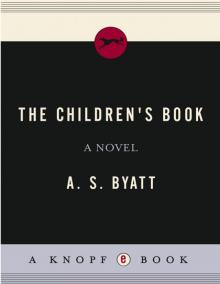 The Children's Book
The Children's Book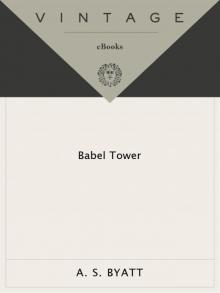 Babel Tower
Babel Tower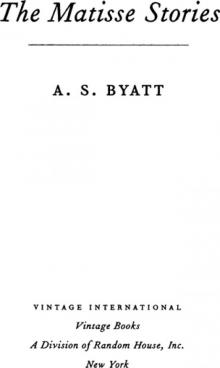 The Matisse Stories
The Matisse Stories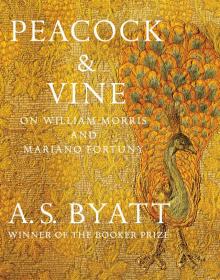 Peacock & Vine: On William Morris and Mariano Fortuny
Peacock & Vine: On William Morris and Mariano Fortuny Elementals: Stories of Fire and Ice
Elementals: Stories of Fire and Ice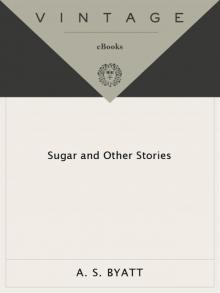 Sugar and Other Stories
Sugar and Other Stories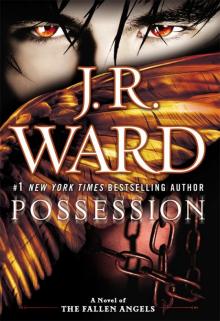 Possession
Possession Little Black Book of Stories
Little Black Book of Stories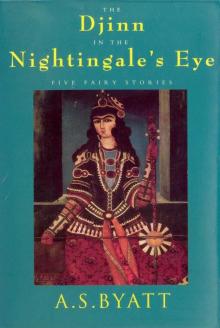 The Djinn in the Nightingale's Eye
The Djinn in the Nightingale's Eye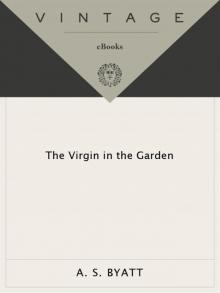 The Virgin in the Garden
The Virgin in the Garden The Game
The Game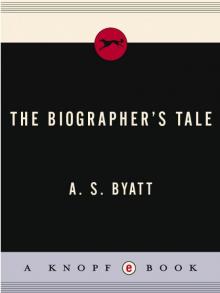 The Biographer's Tale
The Biographer's Tale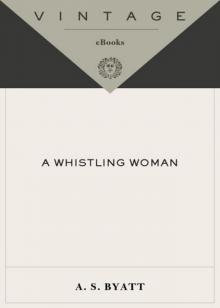 A Whistling Woman
A Whistling Woman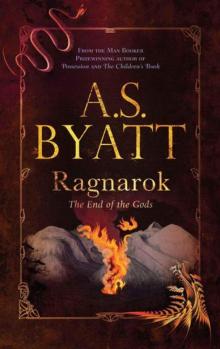 Ragnarok
Ragnarok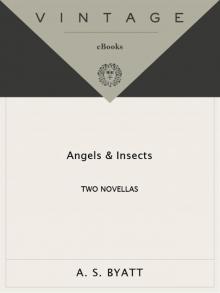 Angels & Insects: Two Novellas
Angels & Insects: Two Novellas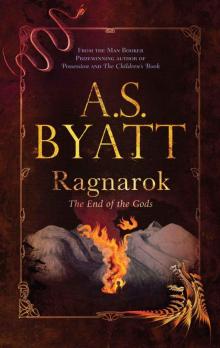 Ragnarok: the End of the Gods (Myths)
Ragnarok: the End of the Gods (Myths)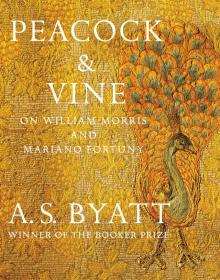 Peacock & Vine
Peacock & Vine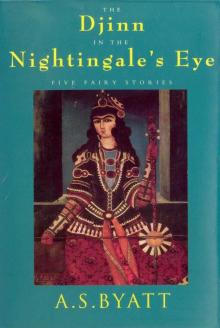 The Djinn in the Nightingale's Eye (Vintage International)
The Djinn in the Nightingale's Eye (Vintage International)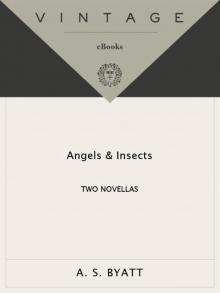 Angels and Insects
Angels and Insects The Arabian Nights: Tales from a Thousand and One Nights (Modern Library Classics)
The Arabian Nights: Tales from a Thousand and One Nights (Modern Library Classics) Elementals
Elementals